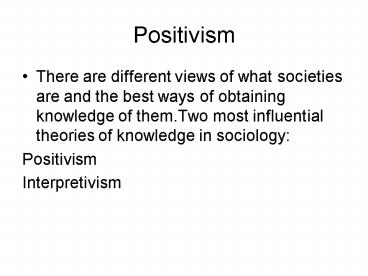Positivism - PowerPoint PPT Presentation
1 / 14
Title: Positivism
1
Positivism
- There are different views of what societies are
and the best ways of obtaining knowledge of
them.Two most influential theories of knowledge
in sociology - Positivism
- Interpretivism
2
Positivism
- Positivism is a logical system that bases
knowledge on direct, systematic observation. - It usually seeks out law-like statements of
social life that can be tested. Its key idea is
unity of scientific method. - Scientific Inquiry is based on the systematic
accumulation of facts rather than on belief,
opinion, tradition or divine revelation. - Sociologists in the 19th century (Comte and
Spencer) believed that by applying the principles
and practices of natural sciences, sociology
could discover the laws that explained how
societies worked and changed.
3
Causality
- For positivists, a good social science, involves
describing and trying to explain causal
relationships. - Positivism sees the social world as comprising
phenomena that are causally related to each
other. - Eg economic recession may cause higher
unemployment and poverty in some sections of a
society and this may then be a cause of
increasing rate of crime.
4
Determinism
- Another positivistic assumption Deterministic
view of relationship between the individual and
society. - This means that the organisation of the societies
in which people live causes them to think and act
in the way they do, irrespective of their free
will or choice. - Researchers adopting a positive point of view may
still be interested in finding out about peoples
subjective views (attitudes and opinions )
through survey research. - In spite of the its deterministic views,
positivism does not necessarily lead to a
fatalistic acceptance of the way things are.
sociological research can look into the causes of
peoples behaviour which can be used to engineer
social change. - To know, to predict and to control (acc to Comte)
5
Empiricism
- Another characteristic of positivistic approaches
is the distinction between theories ( ideas) and
observations (empirical knowledge) - Empirical/factual knowledge is that which can be
directly perceived through senses. (known as
empiricist epistemology) - Empiricist epistemology holds that only valid
source of knowledge is that based on experience. - Empiricist epistemology means that research has
to be grounded in concrete evidence that can be
checked out. - Positivist research is confined to relationships
between observable social phenomena. (facts speak
for themselves)
6
Methods
- For positivists, the goal of sociology is to
produce an objective understanding of societies
by following the principles of natural sciences. - Positive research is guided by scientific
criteria of measuring instruments of
quantification, systematic collection of evidence
reliability and transparency. - Think of the methods they use..
7
Interpretivism
- Interpretivism A tradition developed as a
critique to the dominant one of positivism. - Interpretivist do not reject the idea of
scientific/objective knowledge, but they question
the notion that the methods employed by natural
science used also in the study of society or
social sciences.
8
Max Weber- Interpretivist
- According to Max Weber (1864- 1920) from whom the
interpretivist tradition is derived, the
enterprise of social science could not be treated
as similar to that of the natural science. - He stressed on social action which means the
study of meaning which the individual attaches
to his/her actions
9
How is Interpretivism different from Positivism
- Both logic and methods of natural science are
vastly different from that of social science . - Interpretivism studies human beings who are
socialized individuals and self conscious agents
actively involved in the creation of their own
reality. (unlike the object of enquiry in natural
science).
10
- Interpretivists criticize Positivists for
neglecting the fact that they are studying
people- who need to be explored in the ways they
really think and act in different kinds of
situations. - The humanists movement is also influencing new
ways of thinking about economic behaviour of
human beings. For egeconomists are focusing on
how people really think when they make choices in
the market place. is it really rational choice'
they are excercising? Consumers they find, often
make very irrational choices.
11
- Human beings engage in conscious activities to
which they attach meanings (derived from their
values, beliefs, ideas, motives etc.) - Social institutions (the subject matter of
Sociology) cannot be treated as separate entities
or divorced from the subjective understanding or
meaning that people have of them. - Society cannot be studied on the principle of
causality as positivists stress (stimulus and
response) may make a great deal of sense in the
natural world but according to the
interpretivists, cannot be rigidly applied in the
social world.
12
- People do not just react to external stimuli like
biologically programmed living organisms. They
actively interpret and control the situation and
control their behaviour,acting on the basis of
their interpretations of what is going on, what
is the best option/course of action. - Eg if a teacher shouts at you, how would you
respond?
13
- Many different responses are possible. There are
three different interpretations of a single
event, ie there is no consistent cause and
effect relationship. - Whatever the response, an observer cannot make
sense of your response without interpreting the
meaning you attributed to your teachers
behaviour,for it is this meaning that explains
your response, not the observable event on its
own.
14
Verstehen
- Verstehen is a German word meaning empathetic
understanding. It suggests the practice of a
researcher/anybody seeking to understand
something placing themselves imaginatively in
the position of those they are studying and
asking how they see the world/ what ends are
served by their actions. - Weber pointed out that behaviour seen from the
outside is very different when seen from the
inside. - Now think of the methods interpretivist adopt..

